GPU hosting has become a crucial service for businesses and developers who require powerful computing resources to run demanding applications.
These specialized hosting services utilize Graphics Processing Units (GPUs) to perform complex calculations, making them ideal for tasks such as machine learning, artificial intelligence, and 3D rendering.
In this article, we will list the top best GPU hosting providers.
The Top 7 Best GPU Hosting Providers
1. Hostkey
Best for Customizable Solutions

- High-performance dedicated GPU servers
- Wide range of customizable configurations
- 24/7 customer support
- Advanced security features
- Starting at $99/month
Pros
- Customizable server configurations
- High-performance GPUs
- Comprehensive security measures
- Reliable uptime
Cons
- Higher starting prices
- Complex setup for beginners
Hostkey is the best customizable GPU dedicated servers. Their offerings cater to various high-performance computing needs, including AI and machine learning applications.
Easy of Use: Hostkey provides a range of GPU models like NVIDIA RTX 3080, 3090, and Tesla V100, ensuring top-notch performance for demanding tasks.
They offer flexible configurations, allowing users to tailor the servers to their specific requirements, making it ideal for businesses with unique computational needs.
Why I should use Hostkey: There are different possibilities to customize your dedicated server with a specific GPU and CPU and the RAM you whish.
Who should use Hostkey: Anyone who needs GPU hosting for gaming, AI, deep learning and machine learning.
Pricing starts at $99 per month, offering good value for the power and flexibility provided. Hostkey also boasts robust security measures and 24/7 customer support to ensure smooth operations.
2. GPU-Mart
Best for Affordable GPU Hosting

- Affordable GPU hosting solutions
- Multiple GPU options
- Scalable plans
- Excellent customer support
- Starting at $50/month
Pros
- Cost-effective plans
- Good performance for price
- Scalable hosting options
- Responsive customer support
Cons
- Limited high-end GPU options
- Fewer customization options
GPU-Mart stands out for its affordable and scalable GPU hosting solutions. They offer a variety of plans that cater to different budgets and performance needs.
Pricing: With prices starting at just $50 per month, GPU-Mart is an excellent choice for individuals and small businesses seeking cost-effective GPU hosting without sacrificing performance.
They provide multiple GPU options, including NVIDIA GTX and RTX series, ensuring good performance for various applications. The scalability of their plans allows users to upgrade as their needs grow.
GPU-Mart's customer support is highly responsive, assisting users in resolving issues quickly and efficiently.
3. Linode

- Powerful Infrastructure
- Scalable
- Developer-Friendly
- Starting from $5.00/month
Pros
- High-performance SSDs
- Flexible pricing plans
- 99.99% uptime
- Large library of StackScripts
- Wide range of OS options
Cons
- No managed hosting
- Not beginner-friendly
- No free domain
Linode, a well-regarded GPU hosting provider, offers GPU-optimized virtual machines that cater to parallel processing workloads, such as machine learning, scientific computing, and video processing.
These virtual machines are accelerated by NVIDIA Quadro RTX 6000 GPUs, which feature CUDA, Tensor, and RT cores for executing complex processing, deep learning, and ray tracing workloads. With affordable and scalable GPU hosting plans, Linode has gained a reputation for prioritizing customer service and providing value to its users.
Ease of Use: Linode offers up to four GPU cards per instance, depending on the level of performance needed. The dedicated vCPU cores range from 8-24 cores, a memory from 32GB-128GB, SSD storage from 640GB-7200GB, and transfer from 16-20TB.
Network in and out speeds are 40Gbps and 10Gbps, respectively. With multiple plan types available, Linode's cloud GPU plans can accommodate a variety of workload requirements.
Linode's global infrastructure and data center locations ensure that users can access high-performance resources regardless of their geographical location. This contributes to the platform's reputation for providing flexible and scalable hosting solutions. Moreover, Linode offers a developer portal, community resources, and extensive documentation to support its customers.
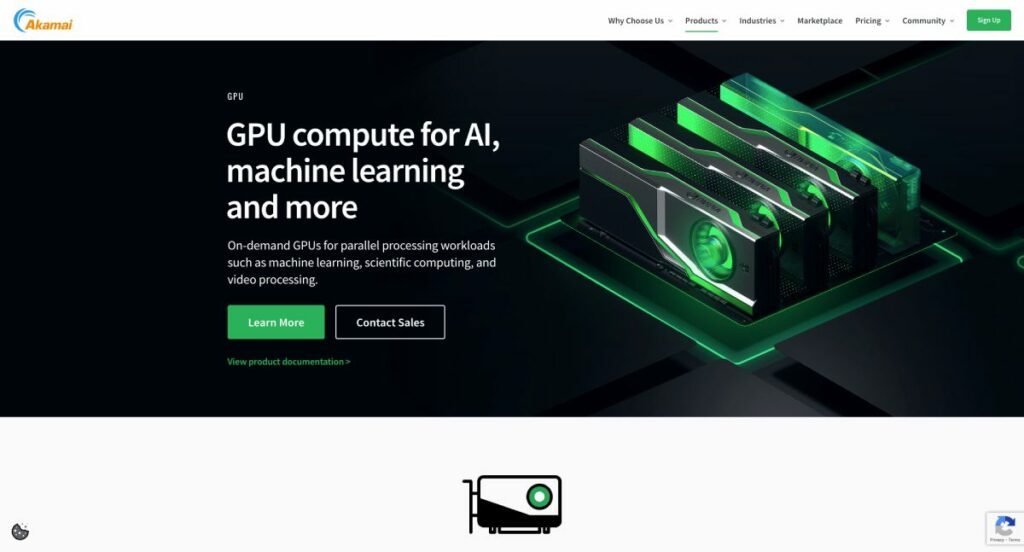
As for pricing, the dedicated plus RTX6000 GPU plan is available at a competitive $1.5/hour. This cost-effective hosting solution allows users to transform capital expenses into operating expenses, leveraging the power of GPUs while benefiting from cloud computing's core value proposition.
One of the key decision-making factors when choosing a GPU hosting provider is the quality of customer support. Linode has received praise for its amazing support, friendly staff, and accommodating user requests, including payment delays. By prioritizing customer service over revenue, Linode has demonstrated its commitment to helping users succeed.
Why should you use Linode? With state-of-the-art hardware, diverse plan offerings, accessible customer support, and cost-effective pricing, Linode caters to individuals and businesses with varying GPU requirements. Furthermore, Linode's comprehensive resource library, including a developer portal and extensive documentation, ensures that users have the tools and knowledge necessary to maximize their GPU hosting experience.
Who should use Linode? Individuals and businesses that require high-performance GPU resources for tasks such as video processing, scientific computing, machine learning, and AI can greatly benefit from Linode's GPU hosting services. With flexible and scalable options, Linode is a go-to choice for those looking to leverage the power of GPUs without investing in expensive hardware.
In conclusion, Linode has proven to be a reliable and affordable hosting for GPU that meets the needs of various users. With a strong reputation for customer service, powerful hardware, and a wealth of resources, Linode is a top choice for GPU hosting in the market today.
Read more: NVIDIA GPU Hosting
4. Amazon AWS

- Scalable Services
- Wide Range of Tools
- Global Infrastructure
- Pay-as-You-Go Pricing
Pros
- Highly scalable and flexible
- Wide range of tools and services
- Strong security features
- Reliable performance
- Global infrastructure
Cons
- Steep learning curve
- Potentially high costs
- Complex pricing structure
Amazon AWS: A flexible and scalable GPU hosting solution
As an experienced hosting review expert, I have tested a wide range of hosting solutions. In this review, I will discuss its key features, global infrastructure, pricing model, customer support, and more. I will also share my honest opinion on who should consider using Amazon AWS as their GPU hosting provider.
Ease of Use: Amazon AWS offers an intuitive interface that simplifies the process of setting up and managing GPU services. Although it might take some time for new users to familiarize themselves with the platform, the wealth of documentation and resources available make it easier to navigate the platform.
Features: Amazon AWS GPU Hosting provides a comprehensive feature set, including Auto Scaling, Elastic Load Balancing, and Amazon Elastic Block Store (EBS) for storage. The platform supports various GPU types, such as NVIDIA Tesla V100 and AMD Radeon Instinct MI25, catering to diverse user needs. AWS also offers extensive security features, ensuring a secure hosting environment. However, some users may find the platform's feature richness overwhelming, and may need to invest time in learning the ropes.
Global Infrastructure: Amazon AWS boasts an impressive global infrastructure with 80 Availability Zones across 25 geographic regions. This extensive coverage ensures that users can access low-latency and high-performance GPU hosting services, regardless of their location.
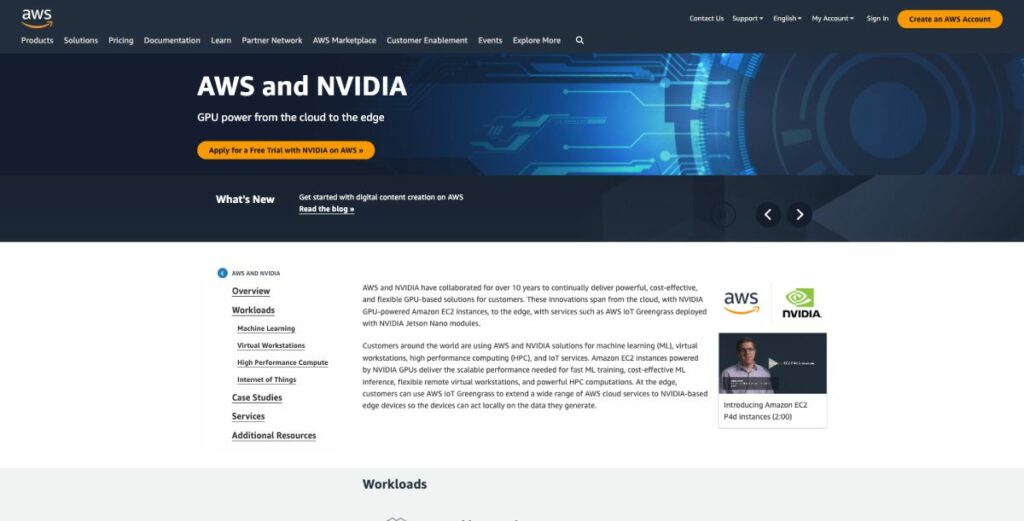
Pricing Model: Amazon AWS pricing model for GPU services operates on a pay-as-you-go basis, making it ideal for businesses with fluctuating resource demands. Users can choose from a variety of pricing plans, including On-Demand Instances, Reserved Instances, and Spot Instances. While this flexibility is a significant advantage, it can also lead to confusion for some users when trying to select the best option for their needs.
Customer Support: Amazon AWS offers excellent customer support, with a vast range of resources, including forums, documentation, and tutorials. Users can also opt for premium support plans with faster response times and more personalized assistance. However, some users may find the premium support plans expensive, especially when compared to other GPU cloud hosting providers.
Who should use it: Amazon AWS GPU Hosting is ideal for businesses that require high-performance, scalable, and secure hosting solutions. With its extensive features and global infrastructure, AWS is a reliable choice for businesses of all sizes, from startups to enterprises.
Amazon AWS offers a robust, flexible, and secure hosting environment that caters to a wide range of user needs. While the platform's complexity may pose challenges for some users, the wealth of resources and customer support options available make it a solid choice for businesses seeking high-performance GPU services.
Read More: 7 Best Docker Hosting Providers 2023 (Compared)
5. Atlantic.Net

- NVIDIA L40S and H100
- HIPAA-compliant
- Tailored for AI
- Custom pricing based on configuration
- Starting $1058.7/mo ($1.5755/hr)
Pros
- NVIDIA-certified Cloud Partner
- Dedicated GPU hosting with no shared resources
- Supports generative AI and real-time rendering
- HIPAA-compliant for healthcare applications
Cons
- Pricing not listed publicly
- No entry-level GPU VPS plans
Best for High-Performance AI & Medical Imaging
Atlantic.Net delivers next-gen GPU hosting using NVIDIA's most powerful GPUs — the L40S and H100 NVL. These dedicated servers are tailored for AI development, 3D rendering, NLP, and scientific computing. Whether you're training LLMs or enhancing virtual meetings with AI video, Atlantic.Net has the muscle for the job.
The L40S GPU is ideal for creatives and developers focusing on generative AI, video editing, and real-time graphics. Meanwhile, the H100 NVL handles large-scale AI and HPC workloads, offering up to 3.9 TB/s memory bandwidth for seamless data throughput.
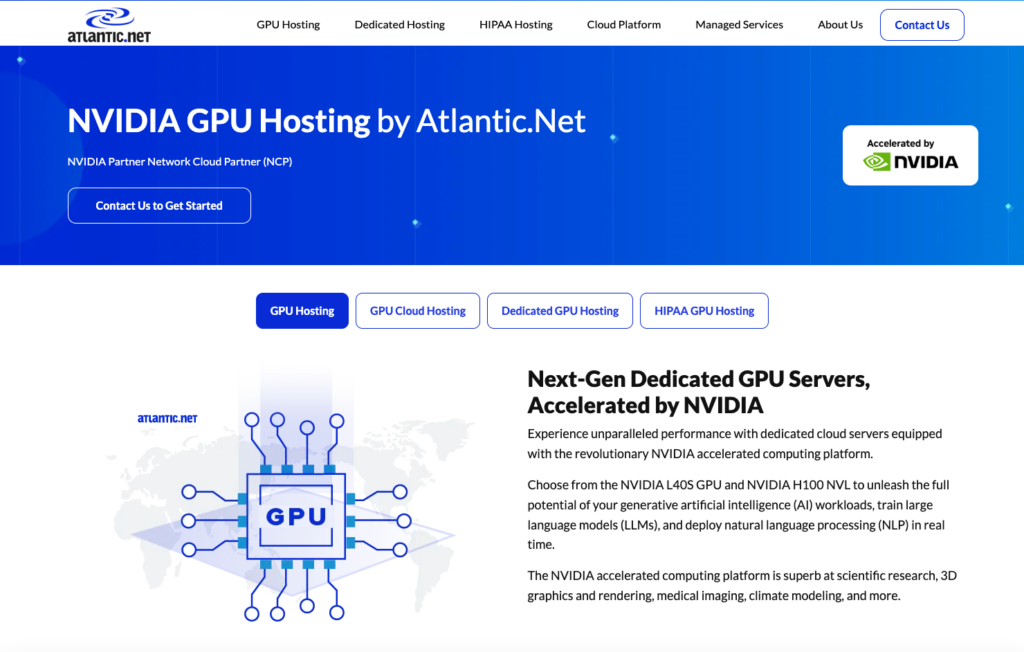
Atlantic.Net's GPU VPS solutions are fully dedicated, with no resource sharing, and are compliant with HIPAA, making them a great fit for healthcare and data-sensitive environments. This is especially important for industries leveraging AI for medical imaging and diagnostics.
As a certified NVIDIA Cloud Partner, Atlantic.Net ensures optimal performance and compatibility with the latest AI and ML tools. You get direct access to cutting-edge hardware for serious compute power.
6. Microsoft Azure

- Flexible and Scalable
- Integrated Environment
- Hybrid Capability
- Starting from $0.02/hour
Pros
- Wide range of services
- Scalable and customizable
- Strong security features
- Good integration with other Microsoft products
- Excellent developer tools
Cons
- Steep learning curve
- Complex pricing structure
- Customer support could be better
Microsoft Azure is an industry-leading GPU hosting provider, offering powerful and versatile solutions for enterprises seeking exceptional performance and scalability. With a comprehensive suite of Azure products and services, Microsoft Azure enables businesses to harness the power of AI, machine learning, and high-performance computing to drive innovation and gain a competitive edge.
Ease of Use: One of the standout features of Microsoft Azure GPU hosting is its user-friendliness. The platform offers a wide array of developer tools, including Visual Studio, Visual Studio Code, and GitHub, that cater to various skill levels and streamline the development process. Additionally, Azure's management and governance tools, like the Azure portal and Cloud Shell, simplify the monitoring and administration of GPU resources.
Key Features: Microsoft Azure GPU hosting boasts an extensive range of features crucial for high-performance computations, including AI and machine learning capabilities, advanced analytics, and a diverse set of databases. Azure also supports hybrid and multicloud solutions, enabling seamless integration with other cloud infrastructures. Moreover, the platform provides robust security features, such as Microsoft Sentinel and Azure DDoS Protection, to safeguard data and applications against potential threats.
Global Infrastructure: Azure's vast global infrastructure ensures world-class performance and reliability. With an extensive network of data centers spanning 60+ regions, Azure enables enterprises to deploy applications closer to their end-users, minimizing latency and optimizing the user experience.
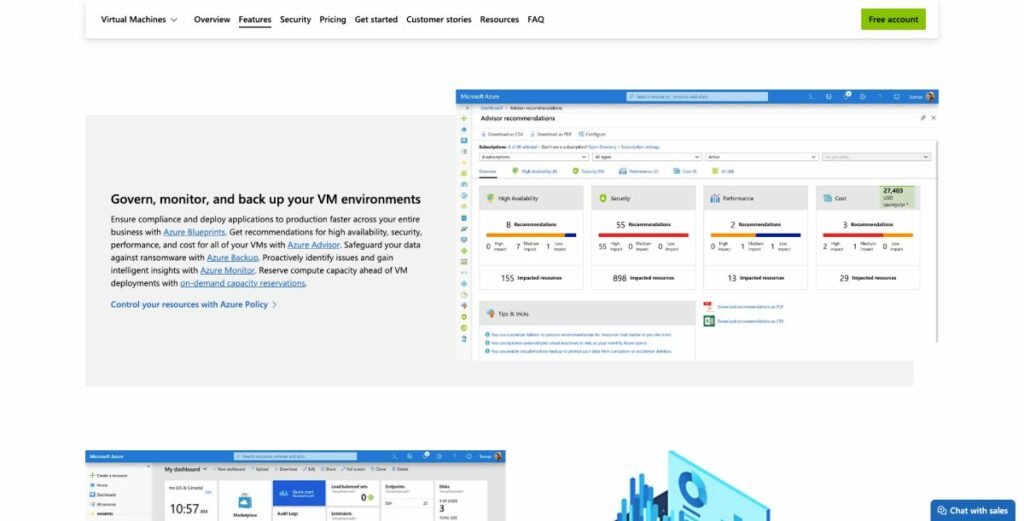
Pricing Model and Plans: Microsoft Azure offers a pay-as-you-go pricing model, allowing enterprises to scale GPU resources as needed and pay only for the actual usage. This flexibility eliminates upfront investments and enables businesses to optimize their costs, based on their specific requirements.
Customer Support and Resources: Azure's customer support is highly praised by users, offering round-the-clock assistance and a wealth of resources, such as the Azure mobile app and Microsoft Cost Management. Additionally, the platform provides numerous customer stories and tutorials, enabling users to gain insights and learn from the successes of others.
Why You Should Use It: Microsoft Azure GPU is an unmatched solution for enterprises seeking to leverage the full potential of GPU-accelerated workloads. With its comprehensive feature set, global infrastructure, and user-friendly tools, Azure empowers businesses to innovate and stay ahead in today's competitive landscape.
Who Should Use It: Microsoft Azure is ideal for enterprises of all sizes, particularly those seeking to harness the power of AI, machine learning, and high-performance computing. Whether you're a startup exploring new AI applications or an established business looking to scale and optimize your GPU resources, Microsoft Azure is a top choice for GPU hosting.
In summary, Microsoft Azure GPU platform offers a robust and versatile solution for enterprises seeking the best in GPU-accelerated performance. With its extensive features, global infrastructure, and user-friendly tools, Azure empowers businesses to innovate and thrive in today's competitive market.
7. Google Cloud

- Powerful Infrastructure
- Scalable Services
- Advanced Security
- Starting from $0.01/hour
Pros
- High performance and reliability
- Wide range of services and tools
- Pay-as-you-go pricing model
- Strong data security and compliance
- Global network of data centers
Cons
- Steep learning curve
- Complex pricing structure
- May require additional management resources
Google Cloud: A High-Performing GPU Platform Platform for Data Analytics and Machine Learning
Google Cloud is revolutionizing the GPU Cloud hosting landscape by offering advanced solutions for data analytics and machine learning workloads. With a wide array of NVIDIA GPUs, including K80, P4, V100, A100, T4, and P100, Google Cloud delivers unparalleled performance and flexibility for users in various industries. Their global infrastructure and robust data centers provide exceptional connectivity and speed, allowing businesses to thrive in today's fast-paced digital environment.
Ease of Use: Google Cloud stands out from its competitors, thanks to its user-friendly interface and platform. It's effortless to set up and configure, making it a top choice for beginners and seasoned professionals alike. Furthermore, with the $300 in free credits for new customers, you can easily test and deploy workloads, giving you a hands-on experience of its capabilities.
Key Features: Google Cloud's high-performance GPUs are designed for scientific computing, 3D visualization, and machine learning applications. Their GPU instances are optimized to balance memory, processing power, high-performance disk, and up to 8 GPUs for maximum efficiency. Additionally, Google Cloud offers cutting-edge networking, data analytics, and storage solutions, making it an all-encompassing platform for all your GPU hosting needs.
Global Infrastructure: The platform boasts an extensive network of data centers, ensuring seamless delivery of applications and services to users worldwide. This global reach not only offers better performance but also enhances reliability and uptime.
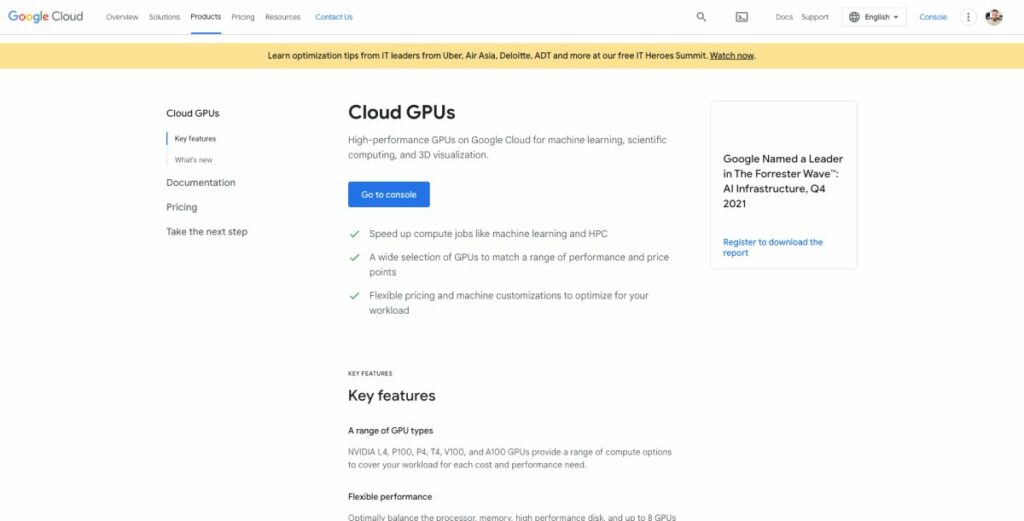
Pricing Model: Google Cloud provides flexible pricing options, allowing users to choose the GPU and machine type that best suits their requirements. The pricing varies depending on the region, GPU selection, and machine type, but you can easily calculate your expenses using the Google Cloud Pricing Calculator.
Customer Support: Google Cloud has an active and passionate community of users and developers who are always eager to help new users and solve any issues they might face. Furthermore, the platform offers extensive resources, such as documentation and tutorials, to assist users in leveraging the full potential of their GPU Cloud services.
Why You Should Use Google Cloud: By choosing Google Cloud, you gain access to unparalleled performance, flexibility, and security for your data analytics and machine learning workloads. With user-friendly features and the backing of a reputable company like Google, you can rest assured that your GPU hosting needs are in good hands.
Who Should Use Google Cloud: Google Cloud's GPU hosting is ideal for businesses of all sizes and sectors, including retail, healthcare, media, and manufacturing. If you're looking to leverage the power of GPUs for your data analytics, machine learning, or high-performance computing needs, Google Cloud is undoubtedly an excellent choice.
In summary, Google Cloud is a top-tier GPU platform that caters to various industries and use cases. With its ease of use, global infrastructure, flexible pricing, and exceptional customer support, it's no wonder Google Cloud has become a favored choice for many businesses looking for a reliable and high-performing GPU service provider. All these features made it one of the best cloud hosting providers on the market.
8. IBM Cloud

- Hybrid Cloud Solution
- AI-Powered Services
- Wide Range of Tools
- Starting from $0.0058/hour
Pros
- Flexible and scalable platform
- AI and machine learning capabilities
- Wide range of tools and services
- Strong data security
- Multi-cloud support
Cons
- Steep learning curve
- Can be expensive for large-scale deployments
- Complex user interface
IBM Cloud An exceptional choice for high-performance GPU hosting, IBM Cloud offers a flexible and powerful infrastructure to handle even the most demanding computational tasks. With its advanced features, wide-ranging server options, and competitive pricing, IBM Cloud is a top contender in the GPU hosting market.
Ease of Use: IBM Cloud provides a user-friendly interface for configuring GPU servers, offering both bare metal and virtual options. The seamless integration with IBM Cloud architecture, applications, and APIs makes it easy to set up and deploy GPU instances for your specific needs. Users can select from an impressive array of server options, such as Intel Xeon 4210 NVIDIA T4 Graphics Card, Intel Xeon 5218 NVIDIA T4 Graphics Card, and Intel Xeon 6248 NVIDIA T4 Graphics Card for bare metal servers or Gx2-8x64x1v, Gx2-16x128x2v, and Gx2-32x256x2v for virtual servers.
IBM Cloud's GPU platform capabilities outperform AWS servers on 5 TensorFlow ML models, making it a more attractive solution for users requiring robust computational power. Additionally, the flexibility to scale GPU resources up or down allows you to adapt to changing demands swiftly.
Global Infrastructure and Data Center Locations: IBM Cloud's worldwide network of data centers ensures that your workloads and data are secure and accessible, regardless of your location. This extensive infrastructure also allows for faster deployment of GPU instances, resulting in quicker results and improved overall performance.
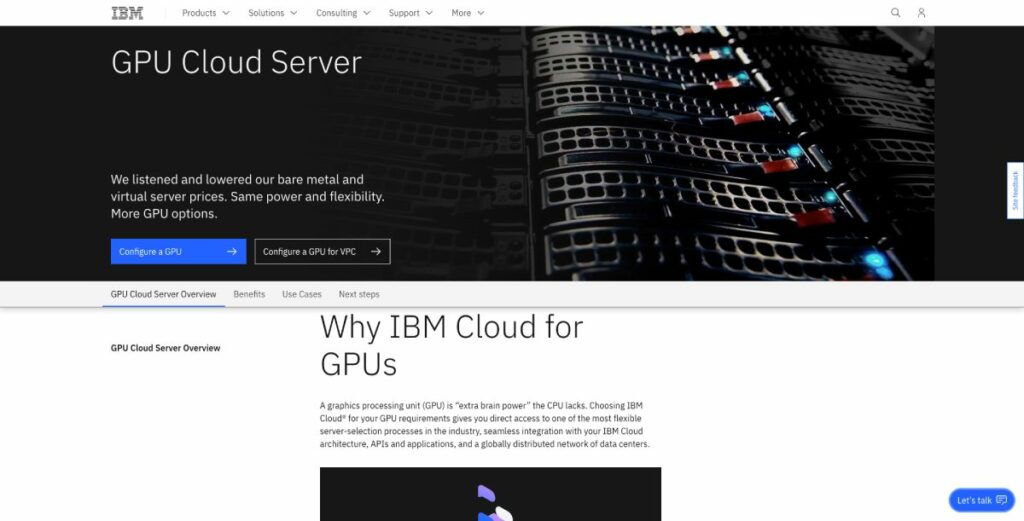
Pricing and Plans: IBM Cloud offers competitive pricing for their GPU services. With a starting price of $819/month for bare metal servers and $1.95/hour for virtual servers, users can access powerful GPU resources without breaking the bank. New customers can also take advantage of a $200 credit towards their first purchase, giving them the opportunity to test out IBM Cloud GPU services without a significant upfront investment.
Customer Support and Resources: IBM Cloud provides top-notch customer support and a wealth of resources, ensuring that users have the assistance they need when setting up and managing their GPU hosting. This level of commitment to user satisfaction is just one of the reasons why IBM Cloud is a frontrunner in this space.
Who should use it: IBM Cloud is an excellent choice for businesses and researchers who need access to high-performance GPU hosting to handle complex computational tasks. Its ease of use, scalability, and wide range of server options make it a versatile solution for organizations of all sizes and industries.
IBM Cloud's GPU services offer a powerful and flexible solution for organizations that require high-performance computing power for tasks such as artificial intelligence, machine learning, and scientific research. With its competitive pricing, global infrastructure, and robust customer support, IBM Cloud is a top pick for users seeking a reliable GPU service provider.
9. Alibaba Elastic GPU
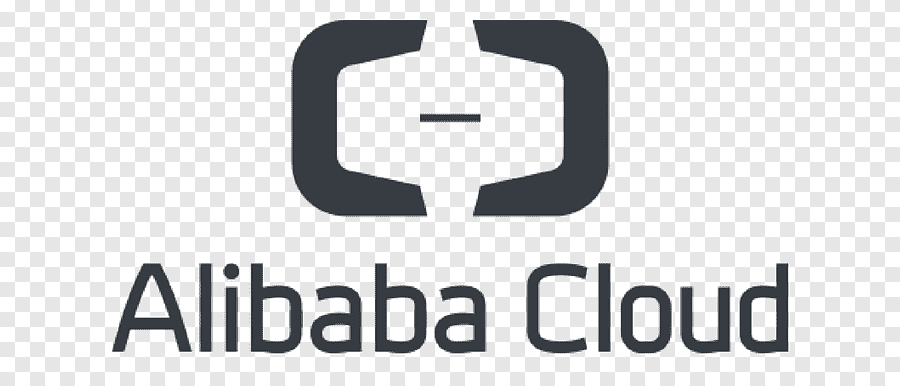
- Scalable GPU Resources
- High Compatibility
- Cost-Effective
- Starting from $0.075/hour
Pros
- Flexible and scalable GPU resources
- High compatibility with various applications
- Cost-effective alternative to traditional GPU instances
- Supports DirectX, OpenGL, and CUDA
- Easy integration with Alibaba Cloud services
Cons
- Only available for Alibaba Cloud ECS instances
- May require some technical knowledge to set up
- Support could be improved
Alibaba Elastic GPU: Recognized as a powerful contender in the GPU hosting market, Alibaba Elastic GPU provides the tools needed for AI and deep learning applications. This service is designed with efficiency in mind, offering users a range of features that cater to their specific needs.
You can also learn more about application hosting: 10 Best Application Hosting Services (Cloud Providers)
Key Features: Alibaba Elastic GPU hosting boasts a flexible architecture, allowing users to customize the GPU resources to match their requirements. With support for various instance types, Alibaba Elastic GPU can handle both compute-intensive and memory-intensive workloads. Additionally, this service provides seamless integration with Alibaba Cloud's other services, making it a comprehensive solution for AI and deep learning projects.
Global Infrastructure: Alibaba Elastic GPU is backed by a robust global infrastructure, with data centers located in major regions worldwide. This extensive network ensures low latency and reliable performance, making it an ideal choice for users who require a high level of connectivity and accessibility.
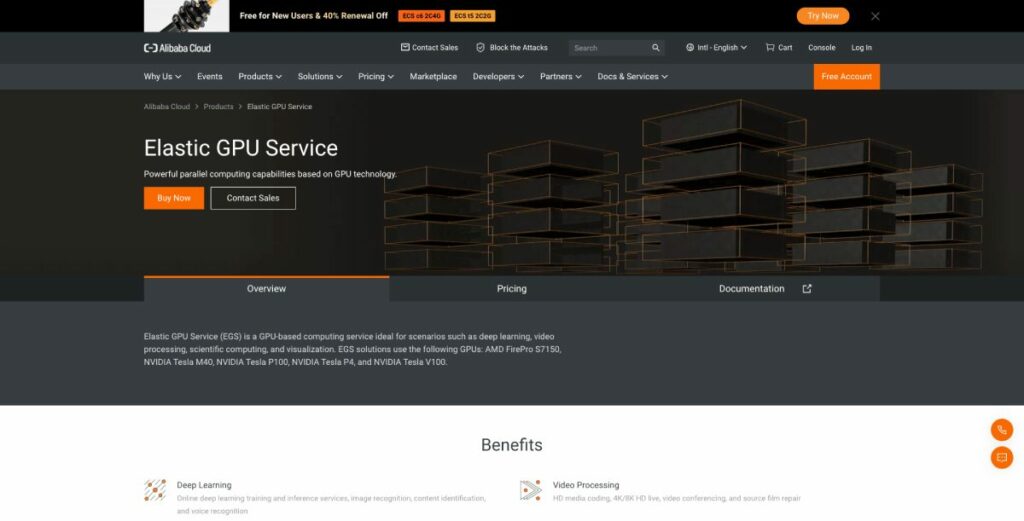
Pricing Model and Plans: The pricing model for Alibaba Elastic GPU is based on a pay-as-you-go system, allowing users to only pay for the resources they consume. This flexible pricing structure helps keep costs manageable, especially for users who need varying GPU resources. There are several plans available, catering to different budgets and performance requirements. This ensures that users can find a plan that best aligns with their needs.
Customer Support and Resources: Alibaba Elastic GPU offers a wealth of resources and customer support options, including 24/7 technical support and an extensive knowledge base. Users can also access a vibrant community forum for further assistance and guidance. This comprehensive support system ensures that users can quickly resolve any issues and continue working without significant disruptions.
Ease of Use: Alibaba Elastic GPU has a user-friendly interface, making it easy for users to navigate and manage their GPU resources. Additionally, the integration with Alibaba Cloud's other services allows for a seamless experience, enabling users to focus on their projects rather than managing their infrastructure.
Who Should Use It: Alibaba Elastic GPU is an excellent choice for users who require a powerful, flexible, and efficient GPU hosting solution for their AI and deep learning applications. With its extensive global infrastructure, customizable plans, and comprehensive customer support, Alibaba Elastic GPU is a reliable choice for users at various stages of their projects.
Alibaba Elastic GPU hosting is a formidable option for anyone looking to harness the power of AI and deep learning. Its range of features, global infrastructure, and user-friendly interface make it a top choice for users who demand high performance and flexibility.
10. Lambda

- Powerful GPU Acceleration
- Flexible Pricing
- Deep Learning Platform
- Starting from $60/month
Pros
- High-performance computing
- Pre-installed deep learning frameworks
- Scalable resources
- Excellent customer support
- User-friendly interface
Cons
- Not suitable for small-scale developers
- Limited data storage options
- Complex setup for beginners
Lambda labs specializes in providing developer-friendly GPU hosting for high-performance computing needs. With an extensive range of NVIDIA GPUs, pre-installed machine learning frameworks, and competitive pricing, Lambda understands the importance of power and flexibility for developers working on GPU-intensive tasks. In this review, we'll explore the key features that make Lambdalabs a top choice for GPU hosting.
Ease of Use: Lambda shines in providing a user-friendly experience with their GPU Cloud service. Pre-configured for machine learning, developers can start training in seconds and enjoy one-click Jupyter access directly from their browser. With popular ML frameworks like Ubuntu, TensorFlow, PyTorch, CUDA, and cuDNN pre-installed, setting up your environment is a breeze.
Key Features: Lambda offers a variety of GPU instances, including NVIDIA A100, RTX A6000, Quadro RTX 6000, and Tesla V100 on-demand. Users can launch instances with 1x, 2x, 4x, or 8x GPUs, and programmatically spin up instances using Lambda Cloud API. This flexibility enables developers to scale their resources as needed and optimize their computing power.
Global Infrastructure: Lambda GPU Cloud service has earned the trust of Fortune 500 companies due to its robust infrastructure and data center locations. Having a global presence ensures reliable performance for users worldwide.
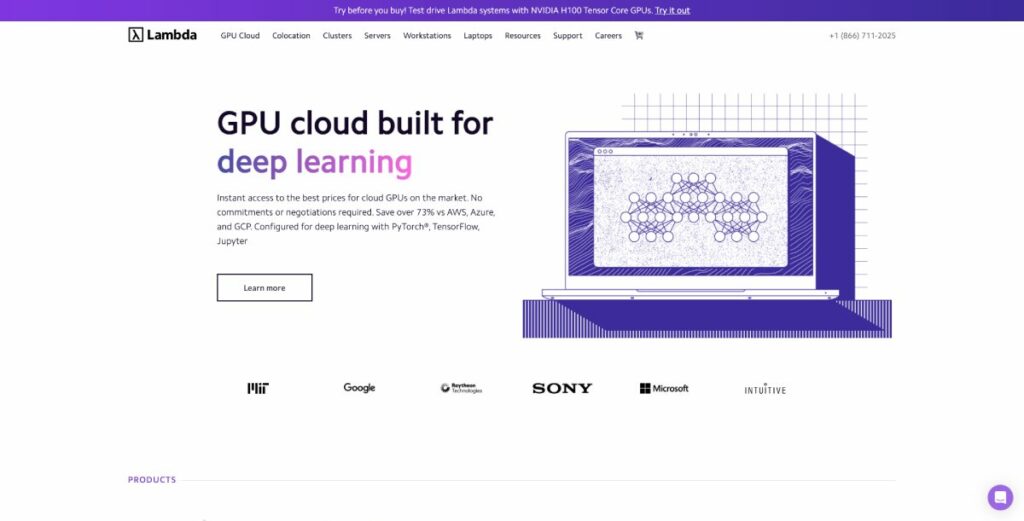
Pricing Model: Lambda offers transparent pricing with no charges for egress, starting at $0.50/hr for one NVIDIA Quadro RTX 6000 GPU. Additionally, they provide reserved cloud cluster pricing, allowing users to reserve an NVIDIA A100 bare-metal cloud cluster with 32+ GPUs for as few as 6 months, ranging from $8.10/hr to $11.43/hr.
Customer Support: Lambda is committed to providing quality support to its users, offering technical assistance through various channels, including a partner portal for their partners. They also maintain active social media presence on platforms such as Facebook, Twitter, LinkedIn, and Instagram.
In conclusion, Lambda stands out as a top choice for GPU hosting by offering powerful GPU instances, user-friendly features, and competitive pricing. Whether you're a machine learning enthusiast or a professional developer, Lambda provides the resources and support you need to succeed. If you're looking for a high-quality, scalable, and cost-effective GPU service solution, Lambda should be at the top of your list.
FAQs
What is GPU hosting?
GPU hosting is a specialized hosting service that provides access to powerful servers equipped with Graphics Processing Units (GPUs). These servers are designed to handle resource-intensive tasks and complex computations, making them ideal for applications such as machine learning, artificial intelligence, 3D rendering, and data analytics.
What is the cost of a GPU server?
The cost of a GPU server can vary greatly depending on the provider, performance, and features offered. Prices can range from as low as $100 per month for a basic GPU-enabled virtual machine to several thousand dollars per month for dedicated, high-performance GPU servers. It's essential to evaluate your specific needs and requirements to choose the most cost-effective solution that meets your performance expectations.
What is the benefit of a GPU server?
GPU servers offer several benefits over traditional CPU-based servers, particularly for resource-intensive applications. These benefits include:
- Faster processing: GPUs can perform parallel processing, enabling them to handle multiple tasks simultaneously, resulting in significantly faster processing times.
- Improved performance: GPU servers can handle complex calculations and workloads more efficiently, making them ideal for applications such as machine learning, AI, and 3D rendering.
- Scalability: GPU hosting services often allow users to scale their resources up or down based on their needs, ensuring optimal performance without overspending on resources.
Is a GPU good for a server?
A GPU can be an excellent addition to a server, especially for applications that require high-performance computing or involve complex calculations. GPUs excel at parallel processing, making them particularly well-suited for tasks such as machine learning, deep learning, data analytics, and 3D rendering. However, for general-purpose server tasks or applications that don't require GPU-specific capabilities, a traditional CPU-based server may be sufficient and more cost-effective.
Why are GPU servers so expensive?
GPU servers are generally more expensive than traditional CPU-based servers for several reasons:
- Higher production costs: GPUs are complex pieces of hardware with a large number of transistors, which makes their production process more intricate and costly.
- Research and development: GPU manufacturers invest heavily in research and development to continually improve GPU performance, optimize power efficiency, and add new features. These costs are often passed on to the end-users.
- Higher performance: GPU servers provide superior parallel processing capabilities, allowing them to handle resource-intensive tasks more efficiently. This enhanced performance makes them more valuable and, consequently, more expensive.
- Limited supply and high demand: The growing demand for GPUs in various industries, such as gaming, AI, machine learning, and cryptocurrency mining, has led to supply constraints, which can drive up prices.
Conclusion
In conclusion, GPU hosting offers a powerful and efficient solution for running resource-intensive applications and workloads.
As the demand for high-performance computing continues to grow due to the AI explosion, businesses and developers can greatly benefit from the enhanced capabilities provided by these specialized hosting services.
By carefully evaluating the features, pricing, and customer support of the top GPU hosting providers, you can select the best option that aligns with your specific needs and requirements.
Ultimately, investing in the right GPU hosting solution can significantly improve the performance and scalability of your projects, ensuring long-term success in today's competitive digital landscape.
As one of the co-founders of Codeless, I bring to the table expertise in developing WordPress and web applications, as well as a track record of effectively managing hosting and servers. My passion for acquiring knowledge and my enthusiasm for constructing and testing novel technologies drive me to constantly innovate and improve.
Expertise:
Web Development,
Web Design,
Linux System Administration,
SEO
Experience:
15 years of experience in Web Development by developing and designing some of the most popular WordPress Themes like Specular, Tower, and Folie.
Education:
I have a degree in Engineering Physics and MSC in Material Science and Opto Electronics.



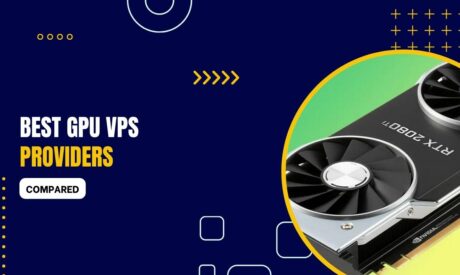
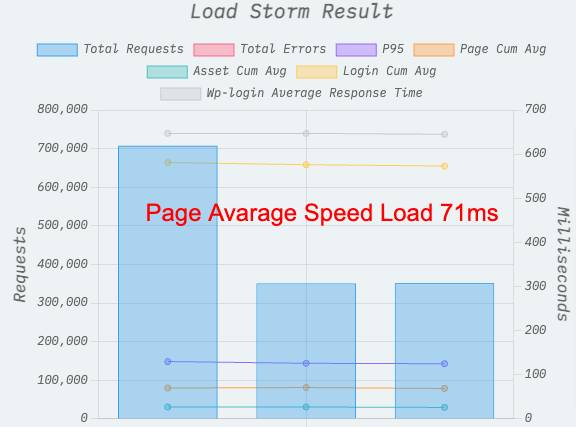

![5 Best Reddit's WordPress Hosting Providers [Most Voted] 2026](https://codeless.co/wp-content/uploads/2023/02/reddit-wordpress-hosting-460x275.jpg)


Comments